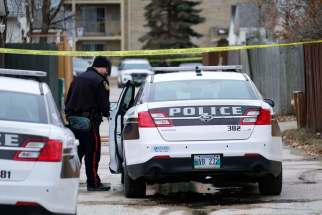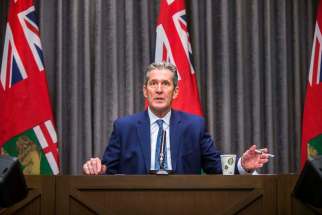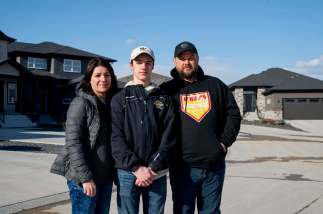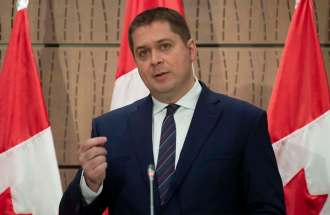More testing key to ending shutdown, premier says; state of emergency extended
Read this article for free:
or
Already have an account? Log in here »
To continue reading, please subscribe:
Monthly Digital Subscription
$0 for the first 4 weeks*
- Enjoy unlimited reading on winnipegfreepress.com
- Read the E-Edition, our digital replica newspaper
- Access News Break, our award-winning app
- Play interactive puzzles
*No charge for 4 weeks then price increases to the regular rate of $19.00 plus GST every four weeks. Offer available to new and qualified returning subscribers only. Cancel any time.
Monthly Digital Subscription
$4.75/week*
- Enjoy unlimited reading on winnipegfreepress.com
- Read the E-Edition, our digital replica newspaper
- Access News Break, our award-winning app
- Play interactive puzzles
*Billed as $19 plus GST every four weeks. Cancel any time.
To continue reading, please subscribe:
Add Free Press access to your Brandon Sun subscription for only an additional
$1 for the first 4 weeks*
*Your next subscription payment will increase by $1.00 and you will be charged $16.99 plus GST for four weeks. After four weeks, your payment will increase to $23.99 plus GST every four weeks.
Read unlimited articles for free today:
or
Already have an account? Log in here »
Hey there, time traveller!
This article was published 20/04/2020 (2058 days ago), so information in it may no longer be current.
Brian Pallister wants Manitoba to become the first province to safely return to life as the pandemic subsides.
And expanded testing is critical to that effort, the premier says.
“Part of beating COVID is to increase and expand the scope of the testing that we do,” Pallister told a news conference Monday, as the province reported its sixth coronavirus-related death.
The Cadham Provincial Laboratory has boosted its testing capacity in recent weeks, and it’s expected to continue to do so in the coming days, the premier said.
Manitoba is also evaluating a potentially game-changing testing device dubbed the Spartan Cube, which can yield results in less than an hour and does not require specialized expertise and the equipment of a large lab.
Pallister said all of this could allow Manitoba to ramp up to perform 2,000 tests per day, if necessary.
New estimates by researchers at Harvard University suggest that the United States cannot safely reopen unless it conducts a minimum of about 152 tests per 100,000 people each day. That works out to about 2,000 tests for a province the size of Manitoba.
Pallister said there will be greater demand for COVID-19 testing as the economy “begins to come out of hibernation.”
“Small businesses, non-profits, charities — even church groups and others — will want to be sure that their interactions are healthy interactions,” he said.
Pallister even produced an acronym — FIRST (First in Restoring Safe Services Together) — to describe his wish that Manitoba lead the way among provinces in gradually reopening parts of the economy that have been shut down due to public-health orders.
“Small businesses, non-profits, charities– even church groups and others — will want to be sure that their interactions are healthy interactions.”
– Premier Brian Pallister
“That’s our goal,” he said. “We have to create the safety — that’s where increased testing, that’s where protocols around reopening are central to our restoration of safe services.”
Dr. Brent Roussin, the province’s chief public health officer, said there are several factors that need to be considered as the province reopens the shuttered sections of its economy.
“We’re going to let the numbers guide us…. We’re ramping up the ability to test to meet increasing demand and making sure the at-risk populations are protected,” he said.
That’s why the province has restricted travel to the North, ordered self-isolation for travellers returning to Manitoba and boosted screening at hospitals and long-term care facilities, he said.
On Monday, the province announced a sixth Manitoban had died from the coronavirus, a Winnipeg woman in her 80s who had underlying health issues and had been in intensive care. Eight patients are in hospital with COVID-19, five of them in intensive care. There are 105 active cases of the coronavirus in Manitoba, and 144 people who have tested positive for the virus have recovered.
The provincial government also extended its state of emergency under The Emergency Measures Act for another 30 days. This gives cabinet special powers during the pandemic, and is different than Public Health Act orders that limit the size of public groups, close or limit non-essential businesses, restrict travel, etc.
“We’re going to let the numbers guide us…. We’re ramping up the ability to test to meet increasing demand and making sure the at-risk populations are protected.”
– Chief public health officer Dr. Brent Roussin
Meanwhile, some surgeries that were delayed due to the pandemic are beginning to resume, said Lanette Siragusa, chief nursing officer with Shared Health.
To free up front-line resources and make room at hospitals, Manitoba pulled back on some health-care areas, postponing non-urgent diagnostic and surgical procedures, deferring non-essential home-care services and offering doctor’s appointments online or by phone.
Now the province is looking at areas where it needs to ramp up services, Siragusa said.
“Surgical activity or diagnostics may need to ramp up again for a period of time in order to ensure patient outcomes are not compromised,” she said, adding some cancer surgeries are proceeding this week at Health Sciences Centre.
“Planning continues to occur at other sites across the province to account for these periods of increased need,” she said.
All patients are asked to make sure that if there’s any change in their status or condition that they let their health-care provider know, she said.
larry.kusch@freepress.mb.ca
carol.sanders@freepress.mb.ca
Province has final say on PPE, work exemptions
Occupational and Environmental Safety and Health has the “final authority” on whether health-care workers get specific personal protective equipment or are exempt from working around COVID-19, a memo from the chief public health officer says.
And it doesn’t matter if they have a doctor’s note.
“Staff and/or physicians who have concerns about an underlying medical condition, medication, or immune compromised status affecting their ability to report to the workplace during the COVID-19 pandemic should contact OESH,” reads Dr. Brent Roussin’s memo, dated April 18.
The doctors in charge of OESH will review the workers’ concerns, conditions and doctor’s notes but will have the final say on whether they need extra PPE or should be exempt from work, it said.
“Doctor/nurse practitioner notes placing restrictions on staff or physician activities in the workplace do not supersede these decisions and will not be accepted,” Roussin’s memo said.
“We wanted the experts to be able to have the final decision on what type of PPE should be used for any given situation,” he said Monday at the daily provincial government COVID-19 media briefing.
He said experts on the nature of the coronavirus in the workplace should decide who could be exempt from working where they may be exposed to the virus.
“It’s not that there wouldn’t be any review of the concerns. It’s just that we wanted occupational health to be able to weigh in on this.”
The memo rattled two of the unions representing workers.
“Having to reveal a medical condition to the employer in order to argue for an accommodation flies in the face of the Personal Health Information Act,” said Darlene Jackson, Manitoba Nurses Union president.
A nurse whose spouse is getting chemotherapy and has a note from a family doctor telling her she can’t be working with COVID-19 patients because if she took the virus home it could be fatal, shouldn’t have to rely on OESH to agree, Jackson said.
“That’s the most unnerving part of this — we don’t know how much discretion is being given to these people,” said Jackson.
The MNU plans to grieve the new policy.
Nurses in other provinces are allowed to use their clinical judgment on a patient-by-patient basis about what sort of PPE they need to use; that’s not the case here, Jackson said.
“This memo shows disdain and distrust of people working on the front line,” she said.
The Manitoba Association of Health Care Professionals said the memo from Roussin was unexpected.
“We’re here to work with the employer and the government continues to make announcements that cause us to go to scramble mode,” said president Bob Moroz.
He said members — some of whom already don’t trust the government — are questioning the memo’s motives.
“They’re trying to get as many people at work as possible,” said Moroz. “The concern is this ultimate authority to essentially ignore the advice of my own personal health-care provider.”
●●●
The Opposition NDP is requesting that the Manitoba legislature be recalled Wednesday to debate planned cuts to the public service.
“Numerous reports indicate the government is planning a series of cuts to jobs and salaries for tens of thousands of front-line workers,” the party said in a letter to house Speaker Myrna Driedger on Monday.
“Now more than ever scrutiny and accountability for the government’s actions are needed to protect jobs and to provide oversight.”
The Progressive Conservative government has asked civil-service managers, universities, Crown corporations and other public-sector organizations to submit proposals for financial savings by Tuesday.
Groups are being asked to find budget savings of anywhere from 10 to 30 per cent. Civil servants face up to 35 days of unpaid leave and/or a reduced work week supplemented by Employment Insurance payments, should Ottawa support that proposal.
The NDP is seeking to recall MLAs so it can provide “the accountability and oversight” of government as part of its duties as the Official Opposition, according to the letter, signed by NDP house leader Nahanni Fontaine.
The government has the ability to recall the legislature at any time. MLAs can also be recalled, by agreement, of the house leaders from each of the three political parties.
On Monday, Premier Brian Pallister defended his government’s efforts to find savings during the pandemic. The provincial government has said it might suffer a deficit as large as $5 billion this fiscal year.
“We want to let people stay working on a reduced basis so we can redirect resources where we can to the front lines…” he said. “There’s clearly reduced demand for some services…. We’re all in this together.”


Our newsroom depends on a growing audience of readers to power our journalism. If you are not a paid reader, please consider becoming a subscriber.
Our newsroom depends on its audience of readers to power our journalism. Thank you for your support.
History
Updated on Monday, April 20, 2020 11:22 PM CDT: Fixes typo.







